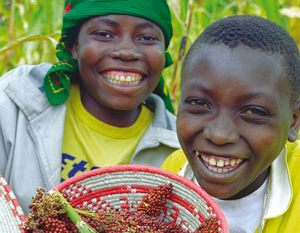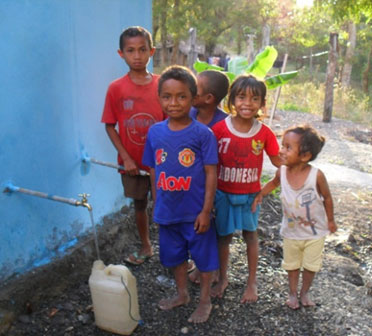The Global Agriculture and Food Security Program is helping poor rural people increase their incomes and improve long-term food security and nutrition. Photo: Alison Preston, AusAID
Sustainable development was established as a guiding vision for development efforts of all countries at the Rio summit in 1992, in recognition of the need for environmental, economic and social wellbeing for today and tomorrow. At the 2012 RIO+20 summit in June 2012, participants recognised the value of developing universal sustainable development goals that effectively incorporate these three dimensions.
Australia and the World Bank are committed to working closely together around the globe and across a wide range of sectors to assist countries achieve more sustainable development outcomes.
Priority is given to strengthening and expanding sectoral cooperation in water, energy, transportation, disaster management, urban development, natural resources and agriculture. In 2011–12, Australia provided more than $65 million to the World Bank's Sustainable Development Network [external website].
Global Agriculture and Food Security Program
Australia is working with the World Bank to improve food security [video, external website] for the majority of the world's poor through the Global Agriculture and Food Security Program [external website]. Australia is the only donor to make a second pledge to this program, and has made a total commitment of $100 million. The program will benefit more than 7.5 million poor people and has already delivered early results.
In Togo [video, external website], for example, the program is helping implement a national agriculture plan and improving seeds, fertiliser and training for small holder farmers to directly benefit 258,000 people.
Global Road Safety Facility
By 2030, global health losses from road crashes for children between the ages of 5 and 14 years are projected to rank second only to those from HIV/AIDS. These losses have already surpassed malaria and tuberculosis.
Australia's support of the World Bank's Global Road Safety Facility helped to improve safety on 3,000 kilometres of national roads in the Philippines. It was estimated that a relatively small investment–approximately $150 million over 20 years–could prevent up to 27,000 deaths and serious injuries through targeted engineering safety measures on the road network. Local engineers and government officials gained on-the-job training and experience in surveying roads for vehicle and pedestrian safety. The second phase of the program will assess an expanded road network and provide assistance to the Philippines Government to implement the safety facilities that were identified in the first phase.
Video: Global Road Safety Facility [external website]
Improving water and sanitation services in Indonesia
The World Bank – Australia partnership in Indonesia has helped increase access to a water supply for approximately 3.51 million people and helped 2.1 million people gain access to improved sanitation. The joint Water and Sanitation for Low Income Communities Project has facilitated 4,610 community organisations and 3,496 community water management groups. Photo: AusAid
Australia is working with the World Bank to improve the provision of water and sanitation services across Indonesia. Since 2008, joint efforts have assisted 5,489 villages in 110 districts and 15 provinces to have a safer water supply, improved sanitation facilities and enhanced hygiene practice.
Desy Deratna Keke is a second grade student at Naileku State Elementary School, Tokbesi village, East Nusa Tenggara–one of the villages supported by the World Bank – Australia water and sanitation program in 2011. When a public tap was installed near Desy's house, she said "Now it's much easier to help my parents get clean water, I have more time to study and play with my friends."
Before the program helped the Tokbesi village, it was very hard to access clean water for cooking, drinking, bathing and washing. The villagers had to walk almost a kilometre to get clean water during the rainy season and about 1–1.5 kilometres in the dry season.
The pipeline that brings clean water to her village has changed the lives of Desy and the entire community. Her parents now have more time for field work and to care for their children. Although they still need to walk a little bit to the new public tap to access clean water, it has changed their lives for the better.


